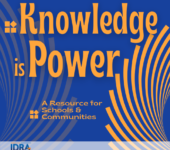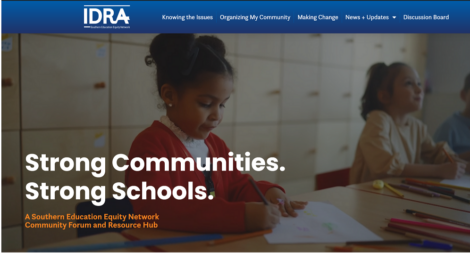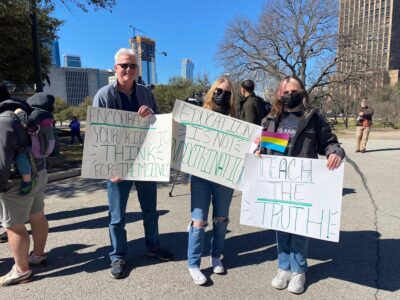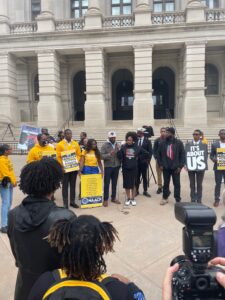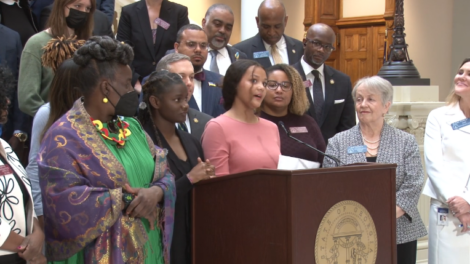
We stand by equity in education. Classroom censorship policies are designed to control and limit the free speech and ideas of teachers and students. Such policies deprive students and teachers of the skills, the knowledge and the confidence to have critical conversations in the classroom.
This hurts all students’ ability to understand themselves and their shared place in our democracy, especially for students of color who are the majority of our student population. And it directly harms Black, Indigenous, Latino, and other marginalized students who already experience racism, marginalization, and systemic oppression.
No student should fear bringing their experiences to the classroom.
Teachers should not fear for teaching about America’s past or present.
Leaders in education have the duty to uphold students’ civil rights and provide truthful, evidence-based information to students and families.
Education thrives in diverse, equitable, inclusive, and culturally sustaining school environments. Censorship and chilling effects are hurtful and deny students content knowledge they need to critically analyze our society or learn how to act as empathetic leaders, advocates, and allies in our democracy.
If policymakers really care about education, they would focus on policies that will have a real, positive impact on all students, like removing police from schools, ending punitive discipline practices, and expanding access to coursework that prepares all students for college should they choose to go. And they would expand ethnic studies courses, truly invest in emergent bilingual students, and adopt culturally-sustaining practices in schools.
Tools for Action!
Knowledge is Power is IDRA’s national resource for educators and advocates to help you do your work for equity and excellence in education in the midst of classroom censorship policies.
.
Our Southern Education Equity Network website is a forum for concerned parents and caregivers, students, community members, and organizational and coalition friends who advocate for public education and student success across the U.S. South. Our School Resource Hub to promote accurate and inclusive education by sharing lessons and teaching tools
.
Learn about the Texas classroom censorship law (SB 3) and advocacy work
.
.
Learn about the Georgia classroom censorship law (HB 1084) and advocacy work
.
The Chilling Effect
“A political chilling effect occurs when a policy creates fear, confusion or uncertainty about its implementation, especially when the policy language is vague and left open to interpretation but carries high-stakes consequences or penalties. The danger of these policies is that they can cause enough fear to discourage people from engaging in completely lawful behaviors. In schools, they can prevent school officials from feeling empowered to protect the rights of teachers, students and families.” – Dr. Chloe Latham Sikes, IDRA
What Virginia’s Anti-Equity Executive Order 1 and Reports Mean for K-12 Schools and Students – A Guide for School Leaders, November 7, 2022
What Texas’ Classroom Censorship Law Means for Students & Schools (PDF) • Español
Strategies for School Leaders to Melt the Chilling Effects of Bad Education Policy, by Chloe Latham Sikes, Ph.D., IDRA Newsletter, November-December 2021
Books Empower Us to Radically Hope, by Michelle Castillo, Ed.M., March 17, 2022
School District Book Bans
IDRA partnered with other civil rights and educational equity organizations to demand that school districts immediately return the books they had removed from its school library shelves. Most of the books focus on histories of racism and discrimination and the experiences of the LGBTQ+ community and people of color.
- Keller ISD (41 books), August 18, 2022
- Katy ISD (118 books), April 20, 2022
- North East ISD (414 books), April 20, 2022
- Klein ISD (67 books), April 20, 2022
- Granbury ISD (125 books), February 28, 2022
IDRA partnered with other civil rights and educational equity organizations to demand that school districts immediately stop their anti-LGBTQ+ activities and policies, including book bans.
- Keller ISD, November 21, 2022
- Frisco ISD, November 21, 2022
Students in Texas working through Voters of Tomorrow held a rally on March 12 at the Capitol about their concerns over book bans, censorship laws and learning our true history. Students also distributed free “banned” books. IDRA’s Michelle Castillo, Ed.M., spoke at the rally on the capitol steps. See the video and text of her speech online or scroll below. See one of the news stories about the march by Jamal Andress of Newsy.
Advocates push back against bills aimed at banning certain books in school libraries, by Ricardo Lewis, March 12, 2022
Students Protest Book Bans Over Content on LGBTQ Issues, Race, by Mary Retta, Teen Vogue, March 8, 2022
Other News
IDRA Presents Preliminary Findings Showing Negative Impact of Classroom Censorship, August 19, 2022
Recent State Policy on Curriculum Leads to Classroom Censorship in Schools – IDRA Testimony on Interim Charge to Monitor State Policy on Curriculum and Instructional Materials Used in Public Schools, Re: HB 3979 (87R) and SB 3 (87, 2), submitted by Chloe Latham Sikes, Ph.D., to the Texas House Public Education Committee, July 26, 2022
Press conference video featuring Georgia students who were denied the chance to testify against classroom censorship (HB 1084), March 29, 2022
“Equity” is Not Racism, Paula Johnson, Ph.D., March 17, 2022
Webinar: Teaching Truth: Protecting and Advancing Culturally Responsive Curricula in Our Schools. Presented by the Leadership Conference Education Fund, in collaboration with IDRA, Asian Americans Advancing Justice | AAJC, GLSEN, NAACP Legal Defense and Education Fund, Inc., National Black Justice Coalition, National Women’s Law Center, and The Education Trust, February 10, 2022
Serving All Students: Promoting a Healthier, More Supportive School Environment, Hearing by the U.S. House Early Childhood, Elementary, and Secondary Education Subcommittee, February 16, 2022
- Serving All Students – Promoting a Healthier, More Supportive School Environment, Written Testimony by Morgan Craven, J.D., IDRA National Director of Policy, Advocacy, and Community Engagement
- Verbal Testimony Presented by Morgan Craven, J.D., IDRA National Director of Policy, Advocacy, and Community Engagement
- Video of the hearing

